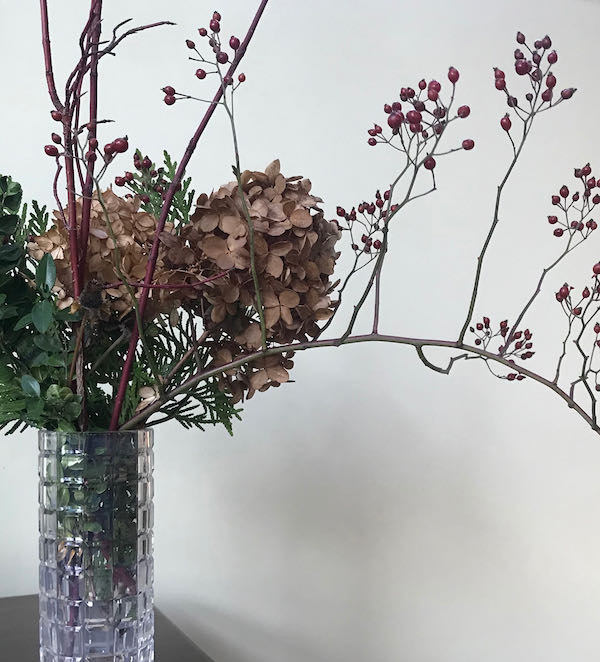Losing Our Egos
I am writing in a pair of handknit wrist warmers this morning. The power went out at 1 a.m. and when I rose at 5, the house was a chilly 55 degrees and falling. I held the cat on my lap, then found a throw. Then I pulled on a coat and stomped around the block for half an hour to prospect for the utility crews I was told were working (this was before my phone ran out of power). I told myself that moving around in 25 degree cold would warm me up. I told myself to buck up. I reminded myself many times over that there are people my age who pace the cold streets like this every day, every night, with no friendly customer care person to reassure them, and no promise of warmth and light coming soon to their kitchen table.
When actual poverty threatens, we are right to dread it. We want to turn away from our losses, and from the reality that thousands of our fellow Americans, out of work due to the pandemic, unable to pay the heating bills, isolated in lonely apartments facing the long uncertain winter, are and will be poor in a material sense for a long time to come.
We resist. But these days I fear that in buffering ourselves from the actual struggles around us, we have come to seek such consolation in the liberties that wealth permits us, we have lost touch with the radical wisdom of poverty as a spiritual way.
I have found myself lately caught in moments in which I am aware that everything in me has been, for a second or two, poured out. I stand emptied of all but wonder and gratitude for the life around me. This is the poverty I want to attend to today, as I prepare for the coming of Advent.
Partly, it is the time of year: The birds have flown through on their way south. The fields come morning are frosted, the woods and parks hold a new wintery silence. I wander out to the garden with my shears and find little to bring inside — a few dried hydrangea blossoms, a spray of wild rose hips, stems of the red twig dogwood, and a frond or two from the evergreen near the house. Late autumn’s tableau.
Cars on the road are quieter, the summer bikers and clusters of young revelers, subdued by the virus and the cold.
We turn inwards, to our books and our sketch pads, our knitting and our mending projects, make pies for Thanksgiving, cards for Christmas.
As I respond to this emptier sense…this strangely light and alive feeling of capacity…my mind turns to those mystics, saints and sages who in the mists of time in one way or another became “poor for love.” They renounced inheritances, shed their holdings, gave what they owned to the poor. Standing in the garden or sitting in the fading light of a November afternoon, I can almost imagine it.
Isn’t our best work a form of love? When we enter into it without ego, without identity in the normal sense of the word — almost as into prayer – don’t we achieve the kind of poverty I write of?
We’ve all had this experience – as a parent, or preparing a meal for a loved one, in the studio, planting a tree.
This past week, my Contemplative Writing Group held its monthly meeting, poets who profligately share their souls on paper. I have friends who write books purely out of love. One woman I know carves amazing wooden birds. Another gifts handmade cards from her remarkable nature photographs. In many ways, I regard the thoughts and images that I offer here as such a labor.
When we work for love, we are inventive. We make things out of nothing. Simplicity and sufficiency become plenty. This kind of work is not for extrinsic reward but for intrinsic value — for the sake of “goodness” — the needs of the earth, and children, and the bodies and souls whose lives touch ours.
It often catches us by surprise, this kind of work. But there’s nothing to say we shouldn’t regard it as one of life’s ideals, even a kind of goal. When we become poor for love we become channels of the warmth and light that is true presence. At a time when so much we’d come to rely on has been taken from us – security of health, stable political and economic life, normal holidays surrounded by family and friends – our salvation may lie in inviting into our winter worlds the radical freedom of poverty, the sweet and difficult labors of love.





Gail McMeekin
November 22, 2020at5:31 pmKathleen,
This blog series feels like a weekly gift of deep inspiration, infused with potent, profound images and invitations. Thank you for these calls to reflection, peace, and hope in the midst of sorrow and fear.
Kathleen Hirsch
November 23, 2020at6:51 amGail, it is my readers who make this work meaningful. Thank you for your support, as always!
Elizabeth Rhymer
November 22, 2020at1:00 pmI feel quiet and still after reading your piece. Love the photo.
Kathleen Hirsch
November 22, 2020at1:02 pmThank you so much, Elizabeth. Guess where the dried boughs are from?!? Yep. :))
Susan Porter
November 22, 2020at1:00 pmThank you Kathleen. This one will be read many times…maybe as a morning meditation for the coming months.
Kathleen Hirsch
November 23, 2020at6:52 amSusan, I love the idea of this as a morning meditation! We can’t be reminded often enough of the higher callings, as you so beautifully remind us with your journals.
Gail ODonnell
November 22, 2020at11:03 amSo inspiring Kathleen, so much to reflect on. Thank you
Kathleen Hirsch
November 22, 2020at11:04 amThank you, Gail! I love to hear from you!